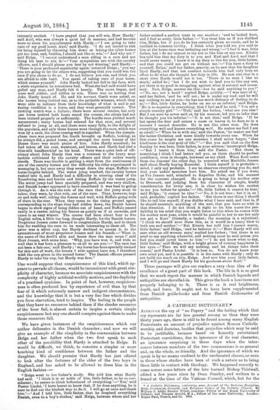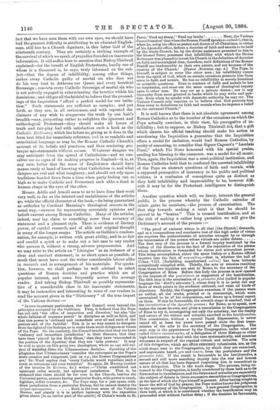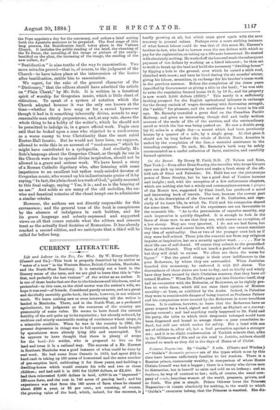A CATHOLIC DICTIONARY.*
ALTHOUGH the cry of " no Popery " and the feeling which that cry represents are far less general among us than they were thirty years ago, there is still to be found among many English Protestants an amount of prejudice against Roman Catholic worship and doctrine, besides that prejudice which may be said to be justifiable, because based on honestly entertained Protestant convictions, due to ignorance of its real character, an ignorance surprising in these days when the inter- course between members of the two communions is so general and, on the whole, so friendly. And the ignorance of which we speak is by no means confined to the uneducated classes, or even to those whose studies have been of such a nature as to bring them little in contact with theology. We happened recently to come across some letters of the late learned Bishop Thirlwall, edited a few years since by Dean Stanley, and written to a friend at the time of the Vatican Council, which, but for the • A Catholic Dictionary, containing some Account of the Doctrine, Discipline, Rik", Ceremonies, Councils, and Religious Orders of the Catholic Church. By William L. Addis, Secular Priest, sometime Fellow of the Royal University of Ireland ; and Thomas Arnold, M.A., Fellow of the same University. London : Regan Paul, Trench, and Co. 1884.
fact that we have seen them with our own eyes, we should have had the greatest difficulty in attributing to an educated English.
man, still less to a Church dignitary, in this latter half of the nineteenth century. They are certainly a striking example of the survival of which we speak, of prejudice founded on inaccurate information. It will suffice here to mention that Bishop Thirlwall explained—for the benefit of English Protestants, hardly one of whom in a thousand is, he says, truly informed on the sub- ject—that the dogma of infallibility, among other things, makes every Catholic guilty of mortal sin who does not do his very best to dethrone our Queen and every heretical Sovereign ; convicts every Catholic Sovereign of mortal sin who is not actively engaged in exterminating the heretics within his dominions; and obliges all the faithful to believe that the proceed- ings of the Inquisition " afford a perfect model for our imita- tion." Such statements are sufficient as samples ; and put forth, as they are, in all seriousness, and with repeated dis- claimers of any wish to exaggerate the truth by one hair's breadth—nay, purporting rather to enlighten the ignorant and nntheological Protestant—they should make all lovers of truth and fair-play bail with satisfaction such a book as the
Catholic Dictionary which lies before us, giving as it does in the
form best fitted for immediate reference, and in as readable and untechnical language as may be, the Roman Catholic Church's account of its beliefs and practices, and thus rendering gro- tesque mis-statements without excuse. Whatever dangers we may anticipate from the spread of Catholicism—and we our- selves see no signs of its making progress in England—it is, at any rate, better that the mass of Englishmen should have
means ready at hand of knowing what Catholicism is, and what dangers are real and what imaginary ; and should not rely upon
traditions handed down from a time when party feeling ran so high.as to make Catholic and Protestant each alike a fiend in human shape in the eyes of the other.
Messrs. Addis and Arnold seem to us to have done their work very well, so far as the interest and readableness of the articles go, while the official character of the book,—its being guaranteed as orthodox by Cardinal Manning's theological censors in the usual way,—ensures its representing accurately opinions and beliefs current among Roman Catholics. Many of the articles, indeed, may lay claim to something more than accuracy of statement and a pleasant style. There is evidence of literary power, of careful research, and of able and original thought in many of the longer essays. The article on Gallileo's condem- nation, for example, is written with great ability, and in so fair and candid a spirit as to make out a fair case to any reader who peruses it, without a strong, adverse prepossession. And we may refer to the article on " Liturgies " as an instance of a clear and succinct statement, in as short space as possible, of ranch that must have cost the writer considerable labour alike in research and in arrangement of his materials. For quota- tion, however, we shall perhaps be well advised to select questions of Roman doctrine and practice which are of popular interest, and come frequently across the average reader. And taking Bishop Thirlwall as possibly representa- tive of a considerable class in his inaccurate statements, it may be instructive and interesting to some of our readers to read the account given in the " Dictionary " of the true import of the Vatican decrees :—
"In two important particulara, the last Council went beyond the principles accepted by the Gallicans. First, it defined that the Pope has not only the office of inspection and direction,' but also the whole fullness of supreme power' in discipline as well as faith, and that this power is ordinary and immediate over all and each of the pastors and of the faithful.' This is in no way meant to derogate from the rights of the bishops, or to make them mere delegates or vicars of the Pope. On the contrary, the Council teaches that they too have ` ordinary and immediate jurisdiction' in their dioceses, that they have been placed by the Holy Ghost,' that they have 'succeeded to the position of the Apostles,' that they are 'true pastors.' It may be well to quote on this point two theologians, whom no one will sus- pect of watering down the Ultramontane doctrine. Speaking of the allegation that Ultramontanes consider the episcopate as the Pope's mere creation and vicegerent, just as e.g., the Roman Congregations are,' Dr. Ward replies that every Catholic would repudiate such a tenet as erroneous and even heretical.' So again, Dr. Murray (author
of the treatise De Ecclesia, &c.) writes Christ established not episcopal order merely, but episcopal jurisdiction. That is, he ordained that there should be for ever in the Church, besides the Universal pastor, pastors having particular flocks, with power to teach, legislate, inflict censures, &c. The Pope may, for a just cause, with- draw jurisdiction from a particular Bishop, but he cannot destroy the corpus episcoporum Such is the true sense of the Vatican Decree, and plainly it is in perfect harmony with the exposition given above [in an earlier part of the article] of Christ's words to St. Peter, Feed my sheep,' `Feed my lambs' Next, the Vatican Council teaches that when the Roman Pontiff speaks as cathedrd, that is, when he, using his office as pastor and doctor of all Christians, in virtue of his Apostolic office, defines a doctrine of faith and morals to be held by the whole Church, he, by the divine assistance promised to him in the blessed Peter, possesses that infallibility with which the Divine Redeemer was pleased to invest his Church in the definition of doctrine on faith and morals,land that, therefore, such definitions of the Roman Pontiff are irreformable in their own nature, and not because of the consent of the Church.' (Pastor Aternus, cap. 4.) The Pope, in himself, is subject to error like other men ; his infallibility comes from the spirit of God, which on certain occasions protects him from error in faith and morals. He has no infallibility in merely historical or scientific questions. Even in matters of faith and morals he has no inspiration, and must use the same means of theological inquiry open to other men. He may err as a private doctor ; nor is any immunity from error granted to books which he may write and pub- lish. Even when he speaks with Apostolic authority he may err. The Vatican Council only requires us to believe that God protects him from error in definitions on faith and morals when he imposes a belief on the universal Church."
It is well known that there is not absolute agreement among Roman Catholics as to the number of the occasions on which the Pope actually exercises, in their view, his prerogative of in- fallibility ; but to suppose, as Bishop Thirlwall did, that a gift which directs his official teaching should make his action in sanctioning the Inquisition a guarantee that the Inquisition offers a model for imitation, would lead Roman Catholics, by parity of reasoning, to consider that Signor Capocci's " Laudate Pueri," which Pio Nono honoured with his special praise, sending his blessing to the composer, was a model for all music. Then, again, the Inquisition was a semi-political institution, and Roman Catholics hold that to confound the asserted infallibility of the Pope on abstract questions of faith and morals, with a supposed prerogative of inerrancy in his public and political actions, is a confusion of conceptions quite as distinct as they hold infallibility and impeccability to be, however diffi- cult it may be for the Protestant intelligence to distinguish them.
Another question which will, we fancy, interest the general public, is the process whereby the Catholic calendar of saints gains its members,—the process of canonisation. The first step towards making a saint is that he should be proved to be "beatns." This is termed beatification, and at the risk of making a rather long quotation we will give the
Dictionary's account of the process :—
" The proof of eminent virtue is all that [the Church] demands, and as a compendious and conclusive test of this high order of virtue she requires the authentication of miracles wrought by or through the intercession of the person whose virtues are under debate The first step of the process is a formal inquiry instituted by the bishop of the diocese as to the fact of the reputation of the person whose beatification is demanded for virtue and miraculous power. This being accomplished, either the same bishop or a Roman official inquires into the fact of non-cultus,—that is, whether the boll of Urban -VIII. [forbidding unauthorised cultus] has been hitherto scrupulously complied with. Thirdly, the acts or minutes resulting from these two inquiries are sent to Rome, to the secretary of the Congregation of Rites. Before this body the process is now opened at the request of the postulators or supporters of the beatification. The fifth step is the nomination of a promoter fidei (called in popular language the devil's advocate'), whose duty it is to point out any flaws or weak points in the evidence adduced, and raise all kinds of objections. Sixthly, the Congregation examines, if the person were an author, all the works, printed or in manuscript, which were ascertained to be of his composition, and draws up a formal report on them. If this be favourable, the seventh stage is reached, that of the introduction of the Apostolic process; for Rome, so to speak, now makes the cause its own, and gives a commission to the Congregation of Rites to try it, investigating not only the notoriety, but the reality and nature of the virtues and miracles ascribed to the beatificandua. This commission, without a special Papal dispensation, is never issued till at least ten years have passed since the first trans- mission of the acts to the secretary of the Congregation. The next step is the appointment by the Congregation, under what are called litterce remissionales, of a delegation of three Bishops or other high functionaries, to deal with the case systematically, and examine witnesses in respect of the reputed virtues and miracles. The acts of this delegation, which are often extremely voluminous, are, as the ninth stage, sent to the Congregation, by which they are examined, and arguments heard, pro and contra, from the postulators and the promoter fidei. If the result is favourable to the beatificandus, a second and still more searching inquiry into the real and inmost nature of all that has been deposed respecting him is committed to a new delegation. This is the tenth stage. The process, being re- turned to the Congregation, is finally considered by them both as to its form and as to its substance, and the virtues and miracles are separatelythe subject of debate in three successive assemblies or Congregations, at the last of which the Pope himself is present. After having sought to judgment to the will of God by prayer, the Pope makes known his udgment to the secretary of the Congregation. A new general Congregation ie then held, at which it is considered whether the beatification may be proceeded with without further delay ; if the decision be favourable,
the Pope appoints a day for the ceremony, and orders a brief setting forth the Apostolic sentence to be prepared. The final stage of this long process, the Beatification itself, takes place in the Vatican Church. It includes the public reading of the brief, the chanting of the Te Deum, the unveiling of the image or picture of the newly- beatified on the altar, the incensing of the image, the reading of the new collect, dzc."
"Beatification " is nine-tenths of the way to canonisation. Two more miracles proved—that is, of course, to the judgment of the Church—to have taken place at the intercession of the beatus after beatification, entitle him to canonisation.
We regret, for the sake of the general character of the "Dictionary," that the editors should have admitted the article on "Plain Chant," by Mr. Sole. It is written in a fanatical spirit of worship for Gregorian music, which is little short of ridiculous. To speak of a system of notation which the Church adopted because it was the only one known at the time—whether for a love song or for a sacred hymn—as though it had in it something inherently divine, sounds to any reasonable man utterly preposterous, and, at any rate, shows the whole thing to be a hobby of the writer's, which he should not be permitted to indulge in, in a grave official work. Pugin once said that he looked upon a man who objected to a rood-screen as a worse enemy to true Christianity than the most rabid Exeter-Hall fanatic. But he would not have been, we suppose, allowed to write this in an account of "rood-screens " which he might have contributed to a cyclopmdia. And similarly, Mr. Sole's language about the Gregorian Chant, as though its use in the Church were due to special divine inspiration, should not be allowed in a grave and serious work. We have heard a story of a Roman Catholic dignitary who, after listening with some impatience to an excellent but rather weak-minded devotee of Gregorian music, who wound up his indiscriminate praise of it by saying, " In fact, the plain chant is a work of God," quietly assented to this final eulogy, saying " Yes, it is ; and so is the braying of an ass." And noble as are many of the old melodies, the un- wise and fanatical votaries of the chant tempt one to administer a similar rebuke.
However, the authors are not directly responsible for this excrescence ; and the general tone of the book is conspicuous by the absence of indulgence in such bobbies, and for its grave language and soberly-expressed and supported views on all that comes outside what the editors and censors treat as the actually fixed doctrine of Romanism. It has already reached a second edition, and we anticipate that a third will be called for before long.




































 Previous page
Previous page